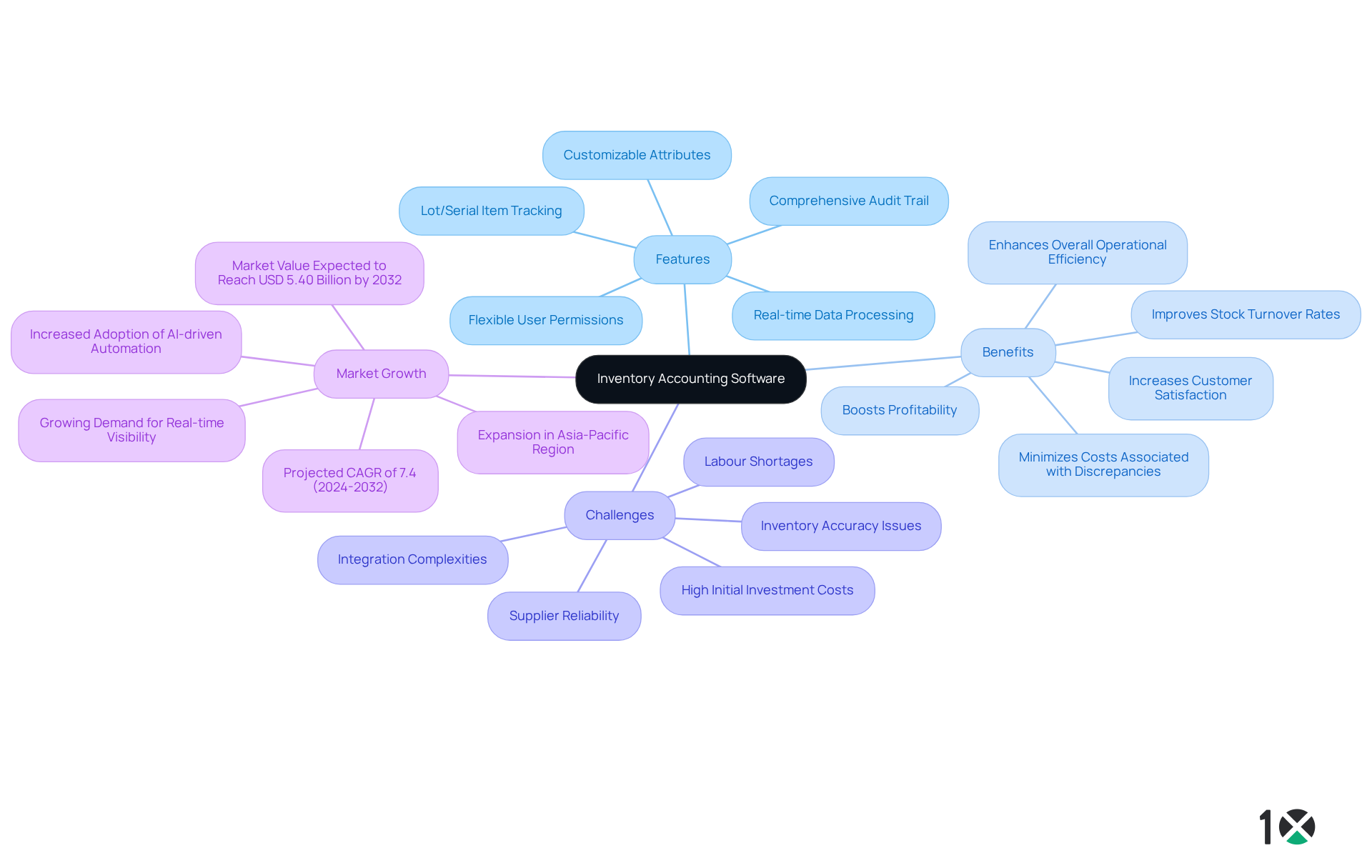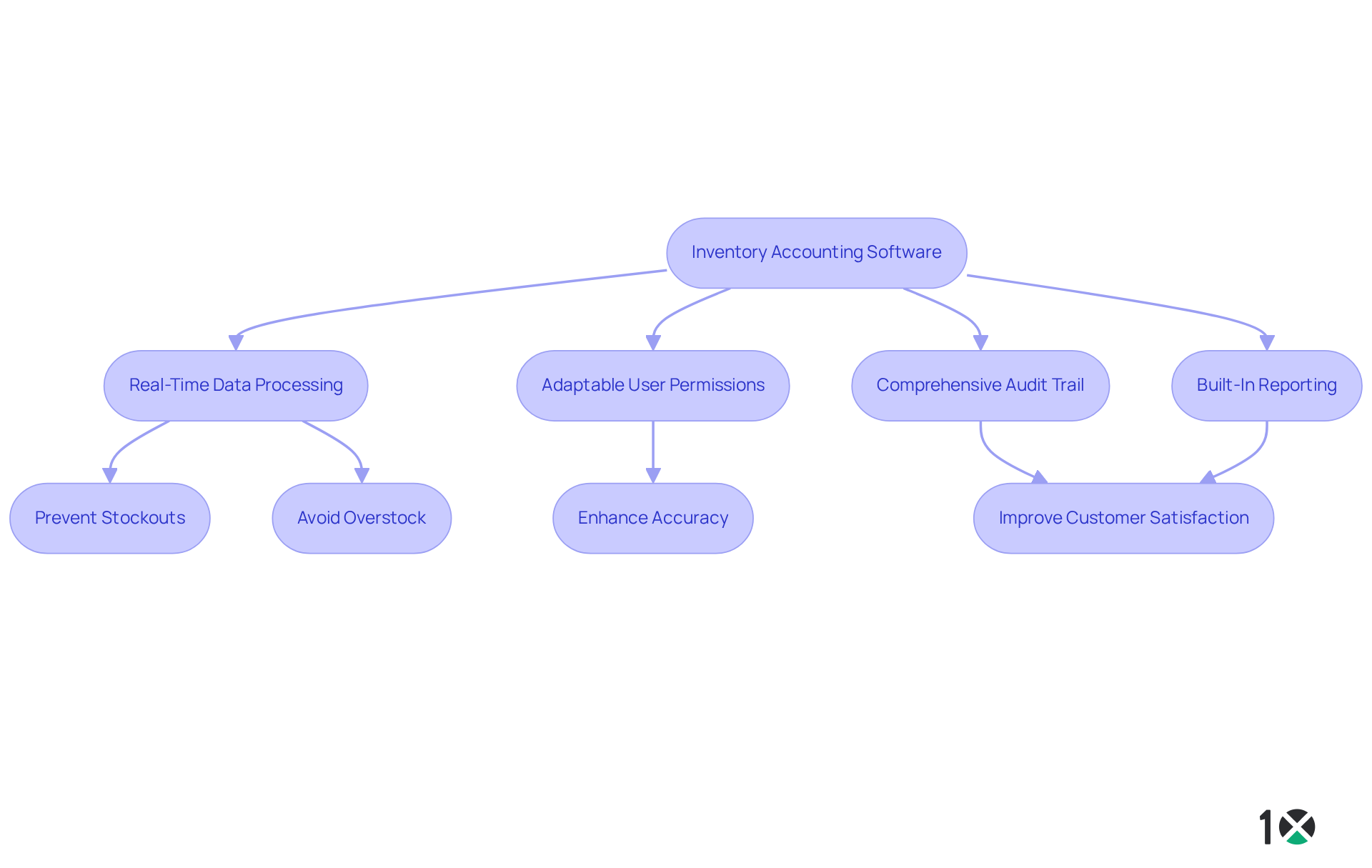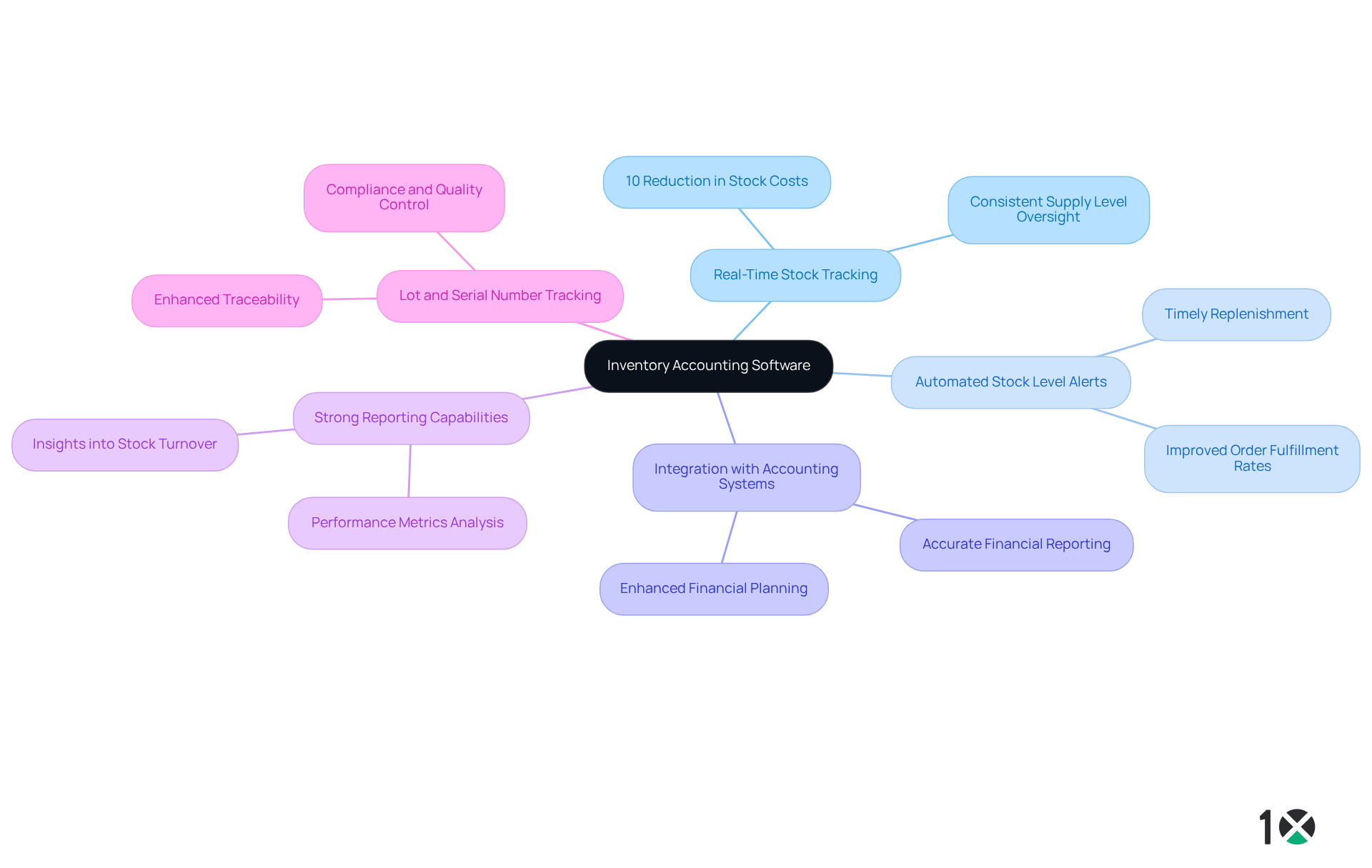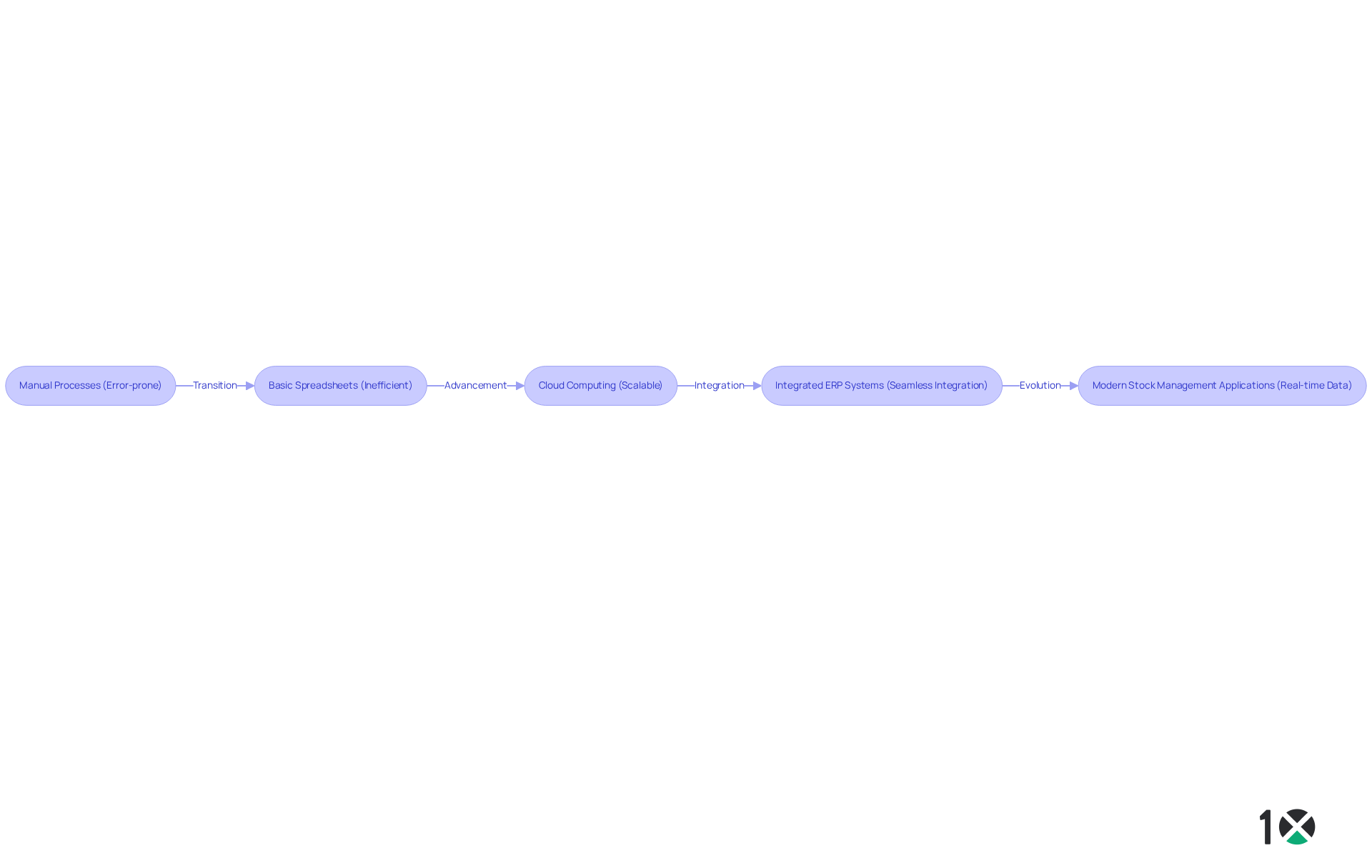Overview
Inventory accounting software is essential for organizations, particularly distributors, as it facilitates the efficient management of stock levels, financial reporting, and operational efficiency. Notably, features such as real-time data processing, automated alerts, and integration with accounting systems significantly enhance stock accuracy and decision-making. These advancements ultimately lead to improved customer satisfaction and increased profitability.
By leveraging these capabilities, organizations can not only streamline their operations but also respond more effectively to market demands. The integration of real-time data processing ensures that inventory levels are always up-to-date, allowing for timely decision-making. Furthermore, automated alerts help prevent stockouts or overstock situations, which can be detrimental to a company’s bottom line.
In conclusion, investing in robust inventory accounting software is not merely a choice; it is a strategic necessity for organizations aiming to thrive in a competitive landscape. Embracing these technological advancements can yield significant returns, making it imperative for Operations Managers to consider this investment seriously.
Introduction
Inventory accounting software is indispensable for the smooth functioning of businesses, especially in the distribution sector, where meticulous stock management is essential. By delivering real-time data processing and seamless integration with financial systems, this software enhances operational efficiency and empowers organizations to make informed decisions that drive profitability.
However, as supply chains grow increasingly complex and technology evolves rapidly, distributors must consider how to effectively leverage these tools to address common challenges such as:
- Stock discrepancies
- Compliance issues
Defining Inventory Accounting Software
Inventory accounting software serves as an indispensable tool for organizations aiming to efficiently oversee and monitor stock levels, expenses, and valuation. By integrating financial principles with stock management processes, inventory accounting software empowers companies to track stock levels, calculate the cost of goods sold (COGS), and maintain accurate financial records. For distributors, the importance of inventory accounting software is paramount as it ensures that stock data aligns seamlessly with financial reporting, enabling informed decision-making and streamlined operations.
10X ERP enhances this integration through its robust financial features, which include:
- Real-time data processing
- Flexible user permissions
- A comprehensive audit trail
- Customizable attributes
- Lot/serial item tracking
These capabilities equip stakeholders to make informed decisions based on precise and timely information. Real-world examples illustrate the impact of stock management software integration, with organizations that have adopted such solutions reporting significant improvements in stock accuracy and operational efficiency. Notably, 62% of organizations in Australia and the USA encounter challenges with stock precision, underscoring the necessity for robust systems like 10X ERP to mitigate these issues. By leveraging stock management tools, distributors can enhance their stock accuracy, thereby improving overall operational efficiency.
Industry leaders emphasize the critical role of stock management tools, noting that they not only enhance visibility into stock levels but also assist in compliance with regulatory standards. The management application market is projected to grow at a CAGR of 7.4% from 2024 to 2032, with the sector expected to reach USD 5.40 billion by 2032. This growth signals that an increasing number of distributors are recognizing the value of these tools. Currently, a substantial proportion of distributors utilize stock management programs, which are vital for maintaining a competitive advantage in a rapidly evolving market.
The benefits of employing inventory accounting software for distributors are extensive. It improves stock turnover rates, minimizes costs associated with discrepancies, and enhances overall operational efficiency. By utilizing these systems, particularly the advanced features of 10X ERP, distributors can refine their stock management processes, ultimately leading to improved customer satisfaction and increased profitability.

The Importance of Inventory Accounting Software in Distribution
In the distribution sector, stock management software is essential for maintaining optimal supply levels and minimizing costs. 10X ERP’s robust financial features—such as real-time data processing, adaptable user permissions, a comprehensive audit trail, and built-in reporting—provide real-time visibility into stock status. This visibility is crucial for preventing stockouts, which cost retailers nearly $1 trillion globally each year, and for avoiding overstock situations that can lead to increased holding costs. By integrating stock oversight with inventory accounting software, distributors can enhance accuracy in financial reporting, streamline operations, and improve customer satisfaction.
For instance, companies utilizing automated stock control systems like 10X ERP have reported a 30% improvement in order fulfillment rates, significantly reducing delivery delays and fostering customer loyalty. Furthermore, this application aids in compliance with financial regulations by ensuring accurate stock records, thereby preventing fines and penalties. Consequently, it becomes an indispensable tool for any distribution company striving for growth and efficiency.
The ability to monitor stock levels not only enhances operational efficiency but also empowers distributors to make informed decisions that align with market demands, ultimately creating a more resilient supply chain.

Key Features of Inventory Accounting Software
Key characteristics of inventory accounting software are crucial for optimizing stock management and enhancing operational efficiency. Real-time stock tracking captures attention by enabling companies to consistently oversee supply levels, significantly reducing the likelihood of shortages and excess. Statistics reveal that effective real-time tracking can lead to a 10% reduction in stock costs, underscoring its financial impact. Automated stock level alerts further build interest, informing users when stock levels dip below established thresholds. This ensures timely replenishment and prevents disruptions in supply. Companies utilizing automated alerts have reported improved order fulfillment rates and enhanced customer satisfaction, generating a desire for these solutions.
Integration with accounting systems stands as another essential feature, ensuring that stock data is accurately reflected in financial reports. This seamless connection facilitates improved financial planning and analysis, as stock valuation directly influences profitability. Strong reporting capabilities offer insights into stock turnover and performance metrics, allowing companies to make informed decisions and prompting action towards better stock management.
Moreover, features such as lot and serial number tracking enhance traceability, which is vital for compliance and quality control. By incorporating these advanced features, companies can optimize their stock management processes, enhance precision, and ultimately achieve operational success.

The Evolution of Inventory Accounting Software
The evolution of stock management systems has been profoundly shaped by technological advancements and the increasing complexity of supply chains. Initially, stock management relied heavily on manual processes or basic spreadsheets, often resulting in errors and inefficiencies. However, the advent of cloud computing and integrated ERP systems, such as 10X ERP, has revolutionized stock management tools into essential resources that offer real-time data processing, enhanced analytics, and seamless integration with other business applications.
10X ERP delivers a comprehensive cloud-based solution tailored specifically for distributors, boasting an intuitive user experience, transparent pricing, and unlimited integrations via modern APIs. This empowers businesses to grasp the value they receive as they expand. Modern stock management applications not only track inventory but also employ predictive analytics, aiding businesses in forecasting demand and optimizing stock levels.
This transformation underscores the growing significance of data-driven decision-making within the distribution sector. Notably, statistics indicate that the market for stock control applications is projected to reach USD 4.79 billion by 2032, reflecting a compound annual growth rate (CAGR) of 9.6%. As organizations increasingly embrace cloud-based solutions like 10X ERP, the transition from manual inventory management to advanced software systems—backed by comprehensive customer support—emerges as a pivotal factor in enhancing operational efficiency and competitiveness.

Conclusion
Inventory accounting software stands as an essential asset for organizations aiming to streamline stock management and enhance financial accuracy. By integrating real-time data processing with robust financial features, such software not only tracks inventory levels but also aligns them with financial reporting. This alignment facilitates informed decision-making and operational efficiency. The significance of these tools, particularly within the distribution sector, cannot be overstated; they empower businesses to improve stock accuracy, reduce costs, and elevate customer satisfaction.
Throughout this discussion, key arguments underscore the myriad benefits of employing inventory accounting software. Features such as:
- Real-time stock tracking
- Automated alerts
- Seamless integration with accounting systems
empower distributors to optimize operations and enhance supply chain resilience. Moreover, the evolution of inventory management is highlighted, showcasing how technological advancements have transformed traditional practices into sophisticated, cloud-based solutions like 10X ERP. With the market for inventory management software projected to experience significant growth, it is evident that organizations are increasingly recognizing the value of these systems.
In a rapidly changing business landscape, adopting inventory accounting software transcends mere trend; it emerges as a necessity for securing a competitive advantage. As companies strive for operational excellence, embracing these advanced tools can lead to improved efficiency, reduced operational costs, and ultimately, greater profitability. The call to action is unmistakable: organizations must invest in robust inventory accounting solutions to navigate the complexities of modern distribution and ensure sustained growth and success.
Frequently Asked Questions
What is inventory accounting software?
Inventory accounting software is a tool that helps organizations efficiently manage stock levels, expenses, and valuation by integrating financial principles with stock management processes.
Why is inventory accounting software important for distributors?
It ensures that stock data aligns with financial reporting, enabling informed decision-making and streamlined operations, which is crucial for distributors.
What features does 10X ERP offer to enhance inventory accounting?
10X ERP offers features such as real-time data processing, flexible user permissions, a comprehensive audit trail, customizable attributes, and lot/serial item tracking.
How does inventory accounting software improve operational efficiency?
By providing precise and timely information, it enhances stock accuracy and helps organizations make informed decisions, leading to improved operational efficiency.
What challenges do organizations face regarding stock precision?
Approximately 62% of organizations in Australia and the USA encounter challenges with stock precision, highlighting the need for robust inventory management systems.
What is the projected growth of the management application market?
The market is projected to grow at a CAGR of 7.4% from 2024 to 2032, reaching USD 5.40 billion by 2032.
How does inventory accounting software benefit distributors?
It improves stock turnover rates, minimizes costs associated with discrepancies, enhances operational efficiency, and ultimately leads to improved customer satisfaction and increased profitability.
